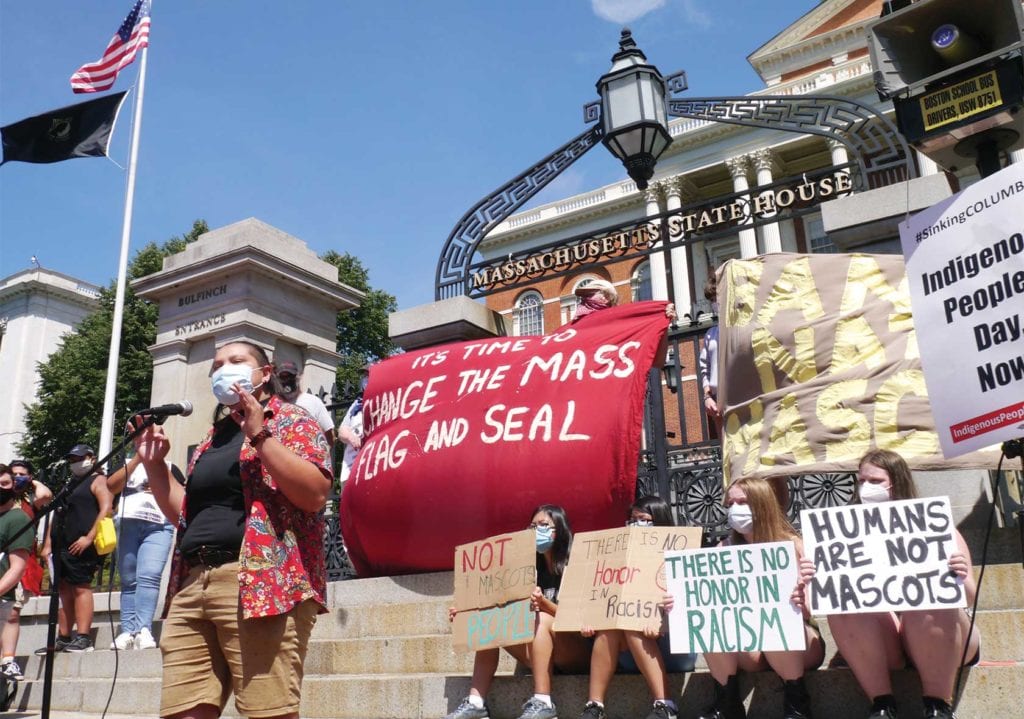Activists push to change Massachusetts state flag
Legislation is aimed at racist mascots, sacred objects

In June, the Mississippi state legislature voted to remove the Confederate battle emblem from the state flag. Last week, the Washington Redskins owner agreed to drop the team’s racially offensive name and mascot under pressure from corporate sponsors.
In Boston last Thursday, a group of Native American activists and allies gathered at the front steps of the Massachusetts State House to push for legislation that would change the state’s controversial state seal and flag, which depicts a Native American man holding a longbow. Above his head is an arm holding a sword — an allusion to the violent conquest at the hands of English colonists. The activists say it’s time to retire the image.

Gina Alkiewicz, a staff member at the North American Indian Center of Boston, speaks during a press conference last week. BANNER PHOTO
“My people are not your mascots,” said Gina Alkiewicz, a Nunatsiavut Government member and a staff member at the North American Indian Center of Boston. “Justice for Native people is coming whether you like it or not, Baker,” she added, addressing Gov. Charlie Baker.
The press conference was flanked by demonstrators protesting a House bill that would extend a moratorium on evictions on one side and a “back the blue” demonstration in support of police on the other.
Rep. Lindsay Sabadosa, lead filer of the bill to change the state flag, said constituents called her office to push for the change.
“Over the past two years, I have had children reach out and ask, ‘Why do we still have a racist flag in the Commonwealth?’” she said. “That’s people their power and pushing it into this building, because nothing happens in there until it happens out here first.”
Sabadosa and others who spoke were repeatedly interrupted by “back the blue” protestors who pushed into the press conference space and shouted over voices of the speakers.
Jean-Luc Pierite, president of the board of the North American Indian Center of Boston, said the interruptions were part of an historic pattern in Massachusetts.
“For 400 years, Native American voices have been silenced in this state and the people who are here trying to silence us today need to move down the street, because this is really disrespectful,” he said.
The three bills activists are hoping to pass this year include House Bill 2776, which would establish a commission to study changes to the seal, motto and flag of the commonwealth; House Bill 443, which would ban the use of Native American mascots by public schools; and House Bill 1811, which would refine Native Americans Graves Protection and Repatriation Act enforcement to include all publicly funded entities in the Commonwealth of Massachusetts.
The latter bill seeks to ensure that sacred and funerary objects are returned to tribal communities of origin and to deter auction houses from selling such objects.
The current state seal and flag are derived from images dating back to the 17th century. The key features, the Native American man holding a longbow, a five-pointed star and the sword raised above the man’s head, came together in 1780 during the American Revolution. The sword, critics say, is meant to represent that of Myles Standish, a 17th-century colonist responsible for acts of genocide against native Massachusetts Indians. Surrounding the image is a Latin motto commonly translated as, “By the sword we seek peace, but peace only under liberty.”
Critics say the imagery and history depicted on the seal celebrate the brutal suppression of the Native Americans who lived in New England. During King Philip’s War of 1675-6, colonists forcibly took the land of Native Americans, including those who were loyal to the English, sold many into slavery in Barbados and left others to die on Deer Island without access to food or shelter.
The effort to change the state seal is not new. A similar bill filed by former state Rep. Byron Rushing in 1989 passed in the House but failed to pass in the Senate.
But in the current political environment, wherein symbols celebrating the nation’s racist past are being challenged and removed, activists and legislators see an opportunity to renew the push for change.
“Right now, in this moment of COVID-19 and the Black Lives Matter movement, what we’re seeing is social structures being challenged fundamentally,” said Pierite. “We can’t have radical change without reconciling the identity of the commonwealth itself.”
The Rev. Vernon Walker said Massachusetts has a reputation as the first state to abolish slavery, legalize gay marriage and pass universal health care.
“I know in Massachusetts we tend to think of ourselves as the vanguard of change,” he told the reporters gathered at the State House. “But we are the last state to abolish and eliminate the white supremacy represented on our flag. The time is now for change.”







